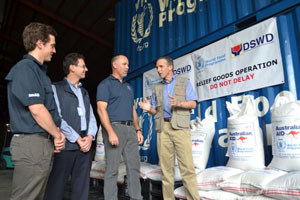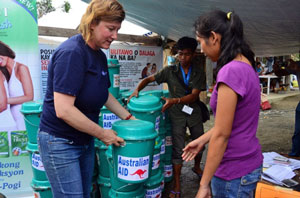Australia will provide an additional $3 million in humanitarian assistance for people are still reeling from the impact of Typhoon Bopha in the southern Philippines.
The additional contribution is to a United Nations appeal for more than 840,000 people left homeless and 700,000 without incomes to support themselves and their families.
Typhoon Bopha devastated the east coast of the Philippines' southern island of Mindanao–a region still recovering from the catastrophic damage caused by Tropical Storm Washi in December 2011. Bopha made a landfall on 4 December 2012 and continued its path for a number of days, leaving a trail of massive destruction in its wake. Bopha was the most destructive typhoon to hit the Mindanao region since 1812.
The Philippine Government swiftly coordinated a strong response and has now started to spearhead early recovery efforts, with the support of local and international partners, to get the affected communities back on their feet.
In response to Typhoon Bopha, Australia has contributed aid to help the thousands of families still homeless and without any means of support.
Australia has provided more than A$10 million for food, safe drinking water, health and hygiene kits, temporary shelters and livelihood opportunities to thousands of affected families including people with disabilities. Australia has also provided support for activities to protect and counsel traumatised children in the worst hit areas.
The World Food Programme (WFP), with Australian support, has dispatched 1,017 metric tonnes of rice, providing life-saving food for 508,500 people. The WFP has also delivered 27 metric tonnes of Plumpy'Doz, a food supplement used to prevent malnutrition, to over 40,000 children aged 6-36 months.
The Philippine Red Cross has deployed emergency kits, which included sleeping mats, mosquito nets and water containers, to 8,500 families. Australia, through the UN Population fund, has provided 4,102 health and hygiene kits for people in evacuation centers. Australia is also helping 2,500 extremely vulnerable people with disabilities and their families have access to relief assistance through Handicap International.
To further assist with the recovery, Australia will provide 4,153 affected families with shelter repair kits through Habitat International, and work opportunities through the International Labour Organization. Australia will also help 25,000 people access clean and safe water, and set up emergency shelters for 3,500 families and safe child-friendly spaces for 3,000 children through Oxfam Australia, Save the Children Australia and Caritas Australia.
Australian Ambassador to the Philippines Bill Tweddell, AusAID Minister Counsellor Octavia Borthwick and AusAID staff saw the extensive damage left behind during aerial assessments of the two worst-hit provinces of Compostela Valley and Davao Oriental. They also met with survivors and witnessed relief operations in the provinces, including the distribution of rice stocks provided by Australian aid through WFP and health and hygiene kits through the United Nations Population Fund.
In a region of the Philippines where subsistence living and agriculture is essential to peoples' livelihoods, the impact of this crisis will have long-lasting effects. Families have spoken of the great loss they have endured. But equally they are no strangers to disaster and are demonstrating their strong resilience in the recovery efforts. As one of the most disaster prone countries in the world there is a renewed emphasis on preparing for the future. Lessons learnt from this disaster will be fed into assessments to assist communities to rebuild more strongly.


